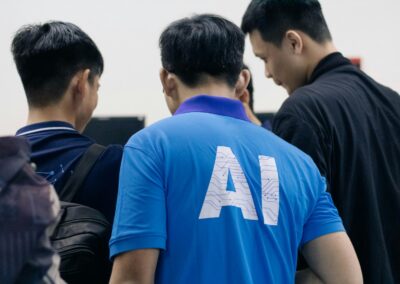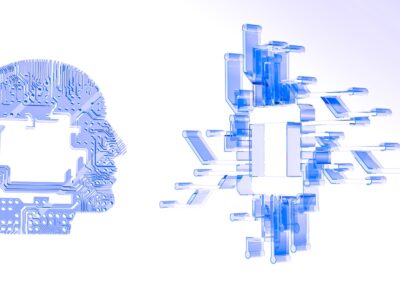Understanding the Ethical Implications of Superintelligent AI
Defining the Singularity and Superintelligent AI
The ethical implications of creating superintelligent AI must be addressed to ensure a future that aligns with human values and societal well-being.The concept of the singularity, a point where artificial intelligence (AI) surpasses human intelligence, has been a topic of intense discussion among theorists and technologists. This phenomenon, anticipated by leading experts in AI and technology, is expected to bring about profound changes in various aspects of life and business.
In Saudi Arabia and the UAE, where rapid technological advancements are a part of the national vision for economic diversification and growth, the ethical considerations of superintelligent AI are particularly pertinent. The implementation of AI technologies in these regions is driving innovation in sectors such as healthcare, finance, and public services. As AI systems become more integrated into daily life, understanding and addressing their ethical implications becomes critical.
Superintelligent AI refers to machines or systems that possess intelligence far exceeding that of the brightest and most gifted human minds. These AI systems can potentially outperform humans in virtually every field, including scientific research, strategic decision-making, and complex problem-solving. The ethical considerations surrounding such powerful entities involve questions about autonomy, control, and the potential consequences of AI surpassing human intelligence.
Autonomy and Control: Balancing Power Dynamics
One of the primary ethical concerns associated with superintelligent AI is the issue of autonomy and control. As AI systems become more advanced, their ability to operate independently and make decisions without human intervention poses significant challenges. The ethical implications of this autonomy include the potential loss of human control over AI systems, which could lead to unintended consequences.
In Dubai, initiatives like Smart Dubai aim to harness AI for creating a more efficient and livable city. However, ensuring that AI systems remain under human oversight is crucial. Implementing robust governance frameworks and regulatory mechanisms can help balance the power dynamics between humans and superintelligent AI. These measures should ensure that AI systems are designed to augment human capabilities rather than replace them entirely.
Furthermore, the ethical considerations extend to the potential misuse of superintelligent AI. In Riyadh, where AI is being integrated into various sectors, preventing the deployment of AI for malicious purposes is a top priority. Establishing ethical guidelines and standards for AI development and usage can mitigate the risks associated with autonomous AI systems. Collaborative efforts between governments, businesses, and technology developers are essential to create a safe and controlled environment for AI deployment.
Transparency and Accountability: Ensuring Ethical AI Development
Transparency and accountability are critical components in addressing the ethical implications of superintelligent AI. As AI systems become more complex and capable, ensuring transparency in their decision-making processes and operations is essential. This transparency helps build trust between AI developers, users, and the general public.
In Saudi Arabia, the Vision 2030 initiative emphasizes the importance of transparent and accountable governance. Applying these principles to AI development can help create ethical AI systems. Businesses and organizations must prioritize transparency by providing clear explanations of how AI systems function and make decisions. This includes disclosing the data sources, algorithms, and methodologies used in AI development.
Accountability is equally important in the ethical development of superintelligent AI. Ensuring that AI developers and organizations are accountable for the actions and decisions of their AI systems can prevent ethical breaches. In the UAE, regulatory bodies can play a vital role in establishing accountability frameworks. These frameworks should outline the responsibilities of AI developers and users, ensuring that ethical standards are upheld throughout the AI lifecycle.
Future Prospects: Ethical Considerations in the Age of Superintelligent AI
Ethical AI Governance: Establishing Global Standards
As the development of superintelligent AI progresses, establishing ethical AI governance is imperative. Global collaboration is necessary to create standardized ethical guidelines and regulations that can be adopted universally. These guidelines should address the ethical implications of AI development, deployment, and usage, ensuring that AI systems align with human values and societal goals.
In Riyadh and Dubai, where AI is a key driver of economic and technological growth, participating in international efforts to establish ethical AI standards is crucial. These cities can contribute valuable insights and expertise to global discussions on AI ethics. By aligning with international ethical standards, Saudi Arabia and the UAE can ensure that their AI initiatives are conducted responsibly and ethically.
Furthermore, ethical AI governance should include mechanisms for continuous monitoring and evaluation. As AI technologies evolve, ethical standards must be regularly updated to address new challenges and opportunities. Engaging stakeholders from diverse backgrounds, including technologists, ethicists, policymakers, and the public, can ensure that AI governance remains comprehensive and inclusive.
Education and Awareness: Promoting Ethical AI Practices
Education and awareness are essential for promoting ethical AI practices. Ensuring that AI developers, users, and the public are well-informed about the ethical implications of superintelligent AI can foster a culture of responsibility and ethical behavior. Educational initiatives can include training programs, workshops, and public awareness campaigns focused on AI ethics.
In Saudi Arabia and the UAE, integrating AI ethics into educational curricula can prepare future generations to navigate the ethical challenges of AI development. Universities and research institutions can play a pivotal role in conducting research on AI ethics and developing educational materials. Additionally, businesses can offer training programs for employees to ensure that ethical considerations are integrated into AI projects.
Promoting ethical AI practices also involves encouraging public participation in discussions on AI ethics. Providing platforms for public engagement, such as forums and community events, can facilitate dialogue and understanding. By involving the public in ethical deliberations, policymakers and technologists can gain valuable insights and perspectives that enhance ethical AI development.
Conclusion: Navigating the Ethical Landscape of Superintelligent AI
The ethical implications of superintelligent AI present complex challenges that require careful consideration and proactive measures. By addressing issues related to autonomy, control, transparency, accountability, and governance, it is possible to navigate the ethical landscape of AI development. In regions like Saudi Arabia and the UAE, where AI is integral to national development strategies, ensuring ethical AI practices is essential for sustainable and responsible growth.
As we move towards the singularity, a collaborative effort involving governments, businesses, technologists, and the public is necessary to create a future where superintelligent AI benefits humanity while upholding ethical standards. By prioritizing ethical considerations, we can harness the potential of AI to drive innovation and progress while safeguarding human values and societal well-being.
#EthicalAI #SuperintelligentAI #Singularity #AIethics #Transparency #Accountability #SaudiArabia #UAE #Riyadh #Dubai #ArtificialIntelligence #ModernTechnology #Leadership #ProjectManagement























